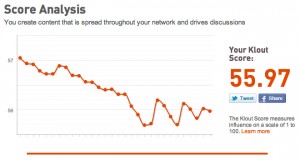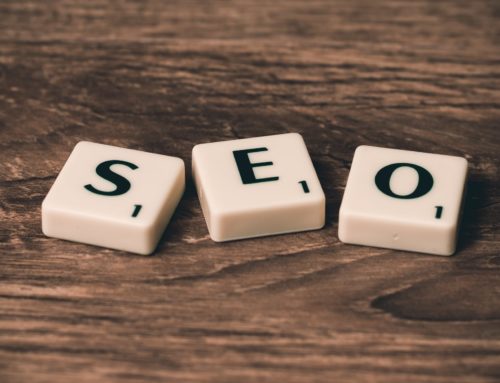
I’ll admit that it’s fun to bash Klout. They are on the front lines of the Wild West of determining influence, and who is doing that influencing, online.
Posts have been written ad nauseam (including on this blog, though they’re not the nauseating kind) on the plusses and minuses of Klout’s service, but I think I’ve finally nailed down what bothers me about the service (which I’m still a member of and will continue to use).
I have the belief that, despite what Klout says, it ties a large part of how “influential” you are directly to how much you tweet.
What’s your proof, LaCasse?
Glad you asked.
See that picture to the right (up there, no… there, that’s it)? That’s my Klout score over the past several weeks.
I’ve been busy this summer with a large project at work, moving into a new house, and preparing for the birth of our first child (due August 20th, and that date may or may not be circled in red marker with glitter all around it.), and you know, just enjoying summer with friends and family.
Because of that, my score has dropped from the ballpark of 62 this spring to 56. I’ve been tweeting less.
To put my suspicions to the test, I spent a few days last week tweeting incessantly and then going quiet. You can see in the picture above the spikes of when I was tweeting.
Here’s the question: am I less influential than I was in March? Do my ideas and thoughts matter less? Are they less valuable to my audience simply because I’m not tweeting as much?
I don’t think so. And here’s proof: although I don’t believe the number of people who follow me on Twitter to be incredibly important, that number has continued to steadily rise during the same time my Klout score has dropped.
I have to believe that if I was truly less influential than I was in March, my follower number would have dropped at a similar pace. Are there peaks and valleys to that follower growth? Of course. Generally speaking, that number has inclined while my Klout score has declined over the same period.
This is the main reason I just can’t take Klout incredibly seriously. I think it can be a valuable service… but for that to be the case, its algorithm must be tied more to content than frequency. Clearly, that isn’t the case right now and I think that’s a shame.
I realize Klout is relatively young and has a long way to go to mature as it fine-tunes its product. For the time being, it remains a game as far as I’m concerned, and not one I can advise my clients to pay any real attention to.









[…] This post originally appeared on Waxing Unlyrical on July 19th, 2012. […]
@PRJon I agree with that article — it is more quasitative than quantitative data.
@askdebra in future when metrics r better, many ppl will use it 2 determine influence. but until they measure better… *sigh*
@askdebra I’ve said it all along- metrics r wonky (& he’s right the way Twitter plays gr8 role)- but the idea is a good one IMO
@christuttle @askdebra Thanks for the RT’s guys!
@skypulsemedia Thanks for sharing @MattLaCasse post!
@rumblestrip @damnredhead Thank you both!
@rumblestrip thx for the RT!
@damnredhead @shonali I put up with Klout as an occasional dispenser of free stuff. That’s the extent of which I use it. :D
@katrus @shonali me too
@katrus Yup. Like @damnredhead commented, much of why I stay on it is because of the field I work in.
@shonali @katrus I’ve never been one of the “cool kids,” anyway ;)
I totally understand where you’re coming from, and I know that “deleting my Klout profile” has been such a thing that all the cool kids are doing these days. But technically, my title is “Social Data Analyst,” and I simply can’t. I get paid for watching these kind of things.
Is it perfect? Absolutely not. But I kind of enjoy playing the Klout game. . . I mean, a few weeks ago, I got a couple free t-shirts, so why not? Who doesn’t love free t-shirts?
Yes, it has a long way to go, but unfortunately, it’s the best we’ve got right now, other than PeerIndex, which is something I need to keep a closer eye on. ;)
Great post, and keep up the good work!
@damnredhead you brought up something really interesting. @KenMueller blogged about this recently. Klout has gotten a lot of people a lot of free stuff. And often the response from those folks is ‘it was free of course I will take it’. But there hasn’t been any proof this giving away stuff is helping the brands giving the stuff away.
and because @KenMueller is a big play by the rules guy, and you both have received stuff by mail, is there any statement from Klout or the brand that should you blog about the product you are required by law to state you got the stuff for free? I forget is the penalty is 4 years in jail or they cut off your left ear or something but that is a recent law aimed at bloggers and sponsored tweeters etc.
@HowieSPM @damnredhead They ask you to “share” that you got it, via twitter, FB, blog, whatever. I almost never do. Because I’m a hypocritical jerk. If i do share, I share in the way I have on my blog, i.e. Klout gave me a product that I took but is useless because I have no interest in it. I mean…they gave me a pretty nice wine set from Bing. I don’t drink. I talk about the fact that i don’t drink. About the closest I get to that is using the word “whine” occasionally.
They don’t understand influence. At. All.
@KenMueller @damnredhead Influence is something that was created in order to make people money because it was a sellable idea. But it won’t last long as a fad.
I was listening to monday’s Beancast podcast and they were discussing how many social media only agencies are struggling. Social isn’t a stand alone from other marketing channels it helps and supports and has unique functions. But it was sold as stand alone but many book writers, bloggers, gurus etc. But the problem is you do that and you ask to show stand alone results.
In reality I should buy that hair gel you got ken because I saw you do a video blog and your hair looked stunning and I asked ‘wow what is that gel’
@HowieSPM @KenMueller I try to always share . . . I learned that in kindergarten. But I don’t always have time to blog about “hey, I got this shirt via Klout about ___” . . . that doesn’t mean I didn’t share the shirt with my boyfriend, and that doesn’t mean that I don’t wear the shirt, which is still raising awareness, right!?
@KenMueller @HowieSPM @damnredhead On a personal level, I don’t like Klout any more than you (and most of “our” crowd) do. However, I don’t think they misunderstand influence. On the contrary, they understand it all too well.
Whether they market their product the way you or I would… well, that is clearly a different matter.
But here’s the thing. You and I are not their market. Big brands are their market. We are simply the product. And that’s why @markwschaefer comment is spot on. IMHO.
I will say that when I’ve presented my misgivings to Klout, they have always responded in a courteous manner. Earlier this year I moderated a session at What’s Next DC with a senior rep from Klout, and I told him, right up front, that I didn’t cotton to it. He took it in stride, and it turned out to be quite the fun session, actually. So I do like them all as people.
@HowieSPM
Howie, what evidence do you have to say there is no proof that this is helping brands? Are you in contact with these brands? Are you running these campaigns yourself? Where is the data? P.S. In my book there are lots of examples of brands benefiting from these initiatives.
I never link stuff in comments but this came out today and is very timely
http://www.huffingtonpost.com/2012/07/19/american-internet-users-distrust-info_n_1686242.html?utm_hp_ref=tw
[…] Why Klout Doesn’t Measure True Influence – Waxing Unlyrical Ok, this one is a BIT self serving since it’s one that I wrote. Still, I’m not a fan of Klout and I think we need to be wary of it. […]
Matt, I used to think the very same thing, but then I really stopped tweeting (like you, summer is a busy time). To my surprise, my score has steadily increased. My only thought is that from time to time, my friends miss me and summon me via tweet. To Klout, perhaps this show some weird level of influence as I’m on the receiving end of tweets, from folks with steady scores, and somehow that must mean something? That, or they have me confused with someone else. No clue, really!
@EricaAllison my twitter feed was weeping without your presence. I myself was relieved since you normally corner my whole feed with pitches for consumer products and bragging about the powers of facebook.
Wait…
Sorry that was @KenMueller who did that to my feed…..
Nice little experiment here, Matt! You’ve highlighted what I don’t like about Klout. I like to think that my ability to influence others isn’t determined by how much I spam them on Twitter. I like to that it’s my ideas, convictions, writing, arguments, and other factors that influence them. We’re not machines, so you can’t measure us by output alone!
hi thanks for hearing/responding my (nonsense) feedback on twitter. I have to admit that I found this article as more of a poking reminder that I should look at klout again myself. I am one of those people passionately bored with the fly-by-night hyped up stuff like klout. I did check it out because it had great promise but didn’t deliver before it was punted away from my mind.
One thing I think we can agree on is that klout is probably more inaccurate than it ought to be. The idea, I’d bet though, is one we agree should be vastly interesting to explore. For the sake of everyone I’m only focusing on twitter just for brevity’s sake alone!
The challenge I had with your particular article as I was attempting to illuminate within the tweet txt confines is that I think the formula they use is a bit more sophisticated than you gave them credit for.
Do number of tweets count towards the raw score? Yes. But ask yourself why.
I would suggest that it isn’t particular volume per say, but the reach of said volume. If you have no followers or mostly followers that have few followers themselves, than you’re not really reaching anyone. We all probably agree on that. That’s the simple spam rule methodology.
In your case, your volume went down which meant that your ability to reach your 2nd dimension of followers (and thus 3rd, 4th, and so on) was limited in scope. The wider variety your first dimension the larger the reach, right? Well yes and no.
What if your 1st dimension isn’t massive, but you have 1 member in your follower scope, Charlie Sheen in his drug-addled intertubewebiness as a poor man’s example, retweeting everything you say? That means that your ability to reach masses is high, but the true penetration isn’t as much. After all he was basically acting as a meme that offered no real value and while he got folks to say silly stuff like tiger blood and winning, outside of that, it wasn’t like he really was a true influencer. After all, would anyone or any company said, “gosh I better buy this service or product because Sir Charlie Tiger Blood Sheen said so”? Doubtful, unless it was some sort of illegal party favors or something else somewhat unsavory though it perhaps may have funneled self-serving viralness that in of itself was capable of accomplishing that marketing task. Viralness in general can work within this model so that can become triumphantly challenging to illuminate within the scope of such measures like klout. For simplicity we can just agree that in a viral campaign of whatever sort, volume == mass and mass == knowledge independent of influence. (We knew that Charlie loved hookers and drugs and it was funny but we didn’t all decide it was a good path for ourselves, hence no real influence).
Here’s how I think volume makes no difference in the klout model. What if a very high percentage of your tweets are retweeted and reach a vast number of people based off of the retweet firehose alone? Then even if you’re only sending out 5 to 6 tweets a week your influence and therefore reach is massively more important/influential. Which in effect is what I think Klout is attempting to reach. Within this model alone it becomes less and less likely that a single tweet becomes retweeted when the origination happens at a high volume. I also would imagine that Twitter deweighs the noise considerably themselves let alone their 3rd party applications such as klout.
So what this means is that for each tweet of yours that just dies with you, no @ mentions, no retweets, no interactions at all, you are “sullying” your reach to an extent. Sort of like spam in an odd vortex of comparison.
As I tweeted to you about my perhaps ill-advised though topical Viacom + DirecTV comparison – if some show that Viacom broadcasts suddenly doesn’t reach the masses how does that influence the pinnacle or intersection of influence? Obviously rather greatly. But think of it this way: if the Jon Stewarts and Sponge Bobs of the Viacom world bring something topical to the equation that has multiple angles/sides/expressions, that brings some element of value to the emanation of the owner of the beginning conversation/product offering/initial thought/etc. Therefore those starters have high value from an influence peddling or “klout” perspective. But if they’re suddenly “un-massed” what happens? If their reach is liquidated by metaphorically being yanked from DirecTV subscribers, doesn’t that mean that their overall klout over the topics of the day become more muted. Similarly if you suddenly silence yourself, wouldn’t your ability to reach others decrease? And with the internet’s attention span being liquidated to nanoseconds that should mean a steep decline rapidly. So while you argue volume, I don’t necessarily think it is volume so much as the dead dialtone effect.
Likewise, I think we’d all agree that if you’re just speaking in an echo chamber you’re not really “reaching” or “influencing” others. Easy to consider this as a political metaphor. The easy to pick on, political blogs tend to just poke people that already have the same formulated opinion and thus that reach isn’t very important either. The delta here could be how you gauge or consider influence peddling. If you think it’s important to rally up your vowed likeminded souls, then the formula changes a bit. But I don’t think that’s what Klout is trying to achieve – those are easier and more mundane market factors that have been commercialized for some time.
This said, the last argument before I exhume myself from this comment board to the delight of anyone who has made it thus far is simply, Klout is measuring your ability to reach and present valuable content that is thus influencing on the social diagram that has the internet’s various channels have become. I would imagine and suspect that the importance of a tweet is less than that of a facebook status which is perhaps less than that of a google + which is even less weighted than a linkedin status update. The reason being the unwieldiness of each said social application and the scope of each particulars own firehose.
I suspect if one would try to disseminate its formula by reverse engineering their social actions it would be a very long though worthy endeavor and unfortunately not easy to do in a singular construct.
thanks for reading, Jason
ps. I haven’t been on klout in months! now I am curious to see what my score is so I can laugh and be offended! :)
@jsin Thanks for the comment, Jason! I need to percolate my thoughts a bit before getting back to you.
@jsin Jason, apologies for the lengthy delay in responding to you.
After reading your response, I think I see your point now. You’re saying that volume matters; so long as you are generating RT’s and mentions on Twitter, correct? I totally and absolutely buy that. I’m fortunate in that the majority of the tweets I send out generate some kind of response.
The point I didn’t make in the post, that I should have, is that my Klout score has dropped despite steady engagement on Facebook as well. Again, I’m fortunate in that many of my posts generate engagement of some kind. I really don’t think we’re too far apart in our thinking, having re-read your post here.
I have little doubt that Klout’s formula is more complicated that what I believe it to be, but I still feel like it can be gamed; thus my hesitancy to put a whole lot of trust into it.
My Klout score looks about the same as yours lately. I’ve said it before, and I’ll say it again here, I think influence fluctuates so much in so many ways, that I’m not sure it can ever be measured in a meaningful way.
@KenMueller your post on Klout was great!
I actually decided to opt out of Klout. I hadn’t been checking the thing, and I felt guilty about people giving me Klout when I wasn’t returning the favor all that often.
Congrats on the baby! August is the best month, possibly because I have a birthday that month, too… ;D
I have a love-hate relationship with Klout. Thank you for confirming my suspicions. I hardly ever look at Klout anymore because I was tired of a number influencing my tweeting behavior.
@Yogitastic Don’t blame you at all. as I said, I DO think Klout has some value, and can be used as a signpost to point you towards people who are influential on certain topics. The problem is that some are using it as a be all/end all tool for influence measurement.
Nice experiment. I’ve actually noticed the same. AND CONGRATS on the baby news, I wish you the best of luck as you & your family prepare to welcome your first child to the world!
@rachaelseda Thanks, Rachel! We’re SUPER excited for Libby to get here (just 4 short weeks from this Monday is the due date! EEK!).
Very cool experiment Matt. I was wondering… Is Twitter the only account that you have linked with Klout? Number of Tweets may be so influential on your score because metrics are only coming from that one service? That being said… Klout obviously has some issues hahaha.
@NathRuizUIS No, I have several accounts connected. Including Facebook. Which is another reason I think they lean heavily on volume of tweets. Since FB is more passive than Twitter, it is easier to collect “interaction” there. My likes/shares/comments on FB have remained relatively steady over the same time period. Another reason Klout needs to fix their formula.